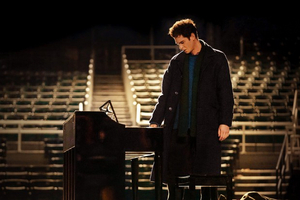Review: TICK, TICK... BOOM!
Lin-Manuel Miranda's directing debut is a damp squib rescued by a fine last 30 minutes and fine performances

![]() Names do not come much bigger than Lin-Manuel Miranda, so his first foray into directing arrives freighted with unfairly high expectations. Since the theme of doom suffuses the film from first to last, one's mind drifts (and at five minutes under two hours, there's plenty of opportunity for drifting) to the thought that the movie itself might be doomed too, a first attempt best left unproduced. But a combination of LM-M's reputation, some fine performances and a strong last half hour saves a film that was going nowhere.
Names do not come much bigger than Lin-Manuel Miranda, so his first foray into directing arrives freighted with unfairly high expectations. Since the theme of doom suffuses the film from first to last, one's mind drifts (and at five minutes under two hours, there's plenty of opportunity for drifting) to the thought that the movie itself might be doomed too, a first attempt best left unproduced. But a combination of LM-M's reputation, some fine performances and a strong last half hour saves a film that was going nowhere.
We're on stage with Jonathan Larson (an excellent, if a little too handsome, Andrew Garfield) who is performing the titular musical, which is about his debut musical Superbia, the one that failed a few years before Rent hit so big. This set up seems more than just a framing device as we return so often to it, but we're also taken into the events the show describes - for a while it's a little confusing. New York apartments are comfortingly familiar though - I half expected Woody Allen and Diane Keaton to turn up across the landing.
Unfortunately, the events are so generic that you can almost predict each scene before they happen. Larson is worried that his time to make it is running out, so he gambles the farm on his unproducable opus. Larson has no money, so sells his beloved records. Larson is obsessed by his showcase, so falls out with his neglected girlfriend (a much underused Alexandra Shipp) who appears to have no agency of her own at all. Larson is committed to art and not money, so he argues with his best friend Michael (Robin de Jesus, also underused). Larson gets help from a wise old mentor (Bradley Whitford hamming it up as Stephen Sondheim) just when all confidence is gone. While this stuff is going on, it's much more fun spotting where LM-M's pals will turn up and who the next one will be. (I had Daveed Diggs in the raffle, so I lost).
It's only when Rent starts to form in Larson's mind that the movie finds its feet and the generic gives way to the specific. The wellspring for that creative energy is the AIDS pandemic that was killing Larson's friends and colleagues with such cruelty in the late 80s. There is an unnecessary piece of advice from his agent to "write about what you know", but it's in this pain and fear that Larson found his voice and the film found its heart - the bohemian giving way to the La Bohèmeian, if you will.
The songs are good with a sprinkling of 11 o'clock numbers and "I Want" showstoppers (though there's none with the heft of "Seasons of Love") and they're given full value by the cast, amongst whom Vanessa Hudgens steals the show as Karessa, the most supportive of an almost universally supportive group of friends and co-workers.
Despite the tragic denouement (and the heartrending contemporary footage of Larson shown over the credits, a man so full of life and so willing to embrace its possibilities), the film's tone is upbeat, a story of triumphing over the relentless and multitudinous obstacles that most be overcome before a musical hits the stage, of people getting by with a little help from their friends. But without Rent, would any of this be interesting enough to sustain one hour never mind two? I'm pretty sure it wouldn't be, which is why it's a shame that we get so much of the development of Superbia (and of tick, tick... Boom! in performance) and not enough of the gestation of Rent.
tick, tick... Boom! is in cinemas and streaming on Netflix from 19 November
Reader Reviews

Videos

